The side of the personality of Paul Allen, about which not many people knew as I would like
An article from the blog of Bill Gates - an American entrepreneur, public figure, philanthropist who created Microsoft with Paul Allen [1953-2018] (with whom they were friends from school)
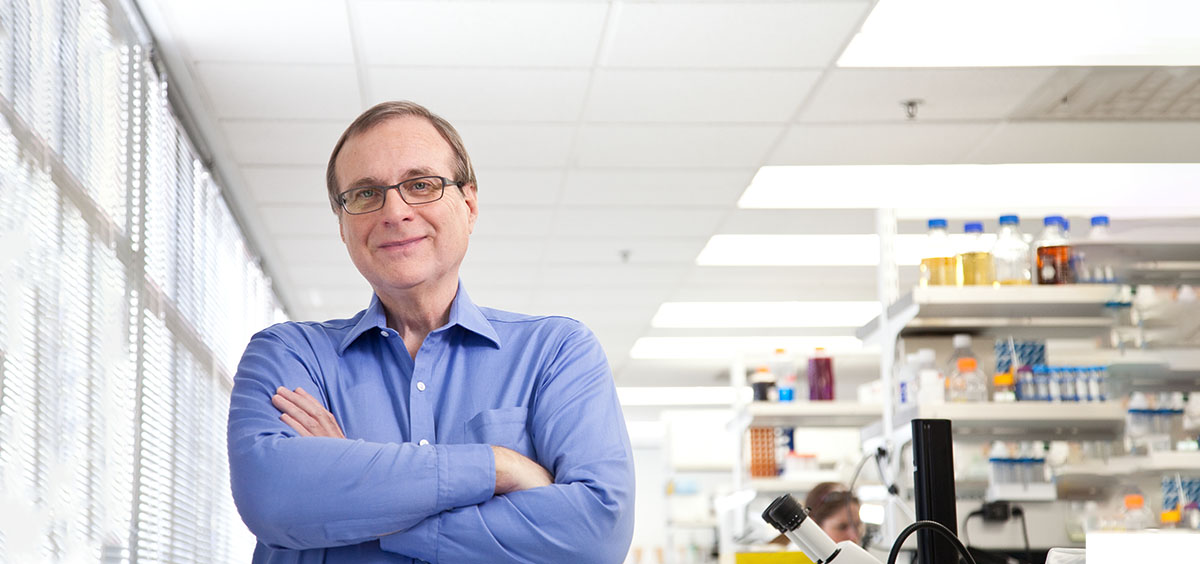
Paul Allen was one of the most curious people I knew. Even when we were children, it seemed to me that he was interested in absolutely everything. Paul could equally well discuss Shakespeare, play the guitar and talk about computers.
')
As an adult, Paul continued to be just as curious. This influenced all facets of his life, including the approach to philanthropy. His generosity was well known, but I would like more people to know how diverse it was. He has influenced so many areas of life, from scientific research and nature conservation to social work.
Recently, I had the opportunity to talk about Paul (and show old photos!) At a congress of philanthropists in New York, organized by Forbes, where he was posthumously awarded the award “For Career Achievements in Philanthropy”. And that's what I told there.
Speech at the Forbes Charity Congress
I am flattered by the opportunity to talk today about my friend, Paul Allen, who this year receives the award For Career Achievements in Philanthropy.
In order to fully appreciate the philosophy that Paul adhered to as part of charity, you need to know about him this: Paul’s entire life has been motivated by his incredible curiosity. Even when we were children, it seemed that he was interested in absolutely everything.
And later, Paul donated funds to solve a huge range of problems not related at first glance to each other. He wanted to prevent the poaching of elephants, to improve the state of the ocean, to promote smart cities. He sponsored the construction of homes for the homeless and the teaching of the arts in Puget Bay. Only in 2014, he supported research on the polio virus, attempts to contain the Ebola epidemic in West Africa, and built a terrific new institute for AI research.
To those who knew him, Paul's portfolio logic was easy to understand. He donated to those things that interested him most, and in those places where, in his opinion, he could influence the situation most of all. Although Paul was interested in many things, he had a deep passion for each of them.

For the first time I saw how much Paul could get carried away with any topic, even in the 8th grade. According to this photo, you might think that he is my teacher, although in fact he was then a sophomore, and less than three years older than me.
This teletype brought us together. Our Lakeside school sold the junk, and bought a teletype with the money. We were just crazy about him. The problem was that it was very expensive to use - at $ 40 / hour! And the only way for us to get computer time was to exploit the error found in the accounting system.
We were eventually burned, but this led to the creation of our first official partnership: we agreed with the company that we would use computers for free, for which we undertook to look for problems in them.
Almost all of our free time we spent with one of the local computers, which only could reach. But then Paul was so interested not only in computers.

This is a photo from his graduation school album. He always loved to read, and he chose all these books himself. They are difficult to distinguish, but among them are the “ Dubliners ” by James Joyce, textbooks on philosophy and physics, and the Bible. Despite the impressive size of the pile, none of the books of his favorite genre: science fiction. I thought I read a lot of fiction, but he crossed out all my achievements. “The Moon is a Harsh Mistress,” all the Heinlein books, the Founders series — we used to go to his house to visit his collection of books, and make sure that I didn't miss anything.
Paul's father was an assistant librarian at the University of Washington. Every time I came to their house, I saw that his home was filled with books. And since Paul had read so much, he knew a lot about many things.
Once I was interested, suddenly, gasoline. I did not understand what "distillation" means. Therefore, I turned to the most erudite person of all that I knew. Paul explained this process to me very clearly and interestingly.
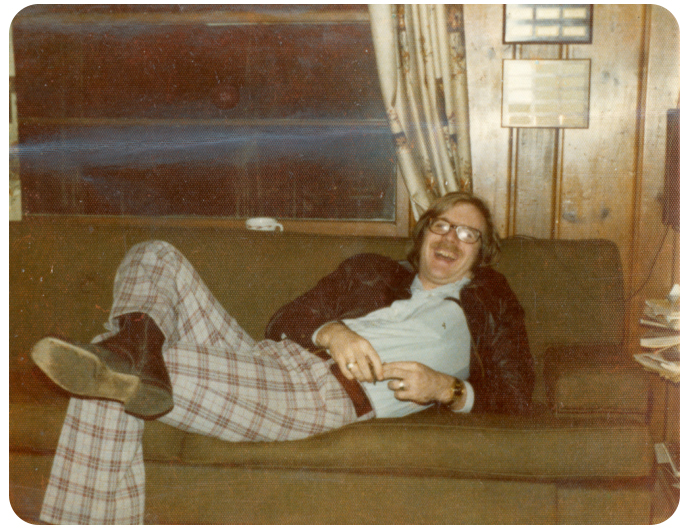
Paul was also a cooler guy than me. He played guitar, he really liked Jimi Hendrix, and I remember how he played for me. Are You Experienced? Then I was still not experienced in almost anything.
However, Paul liked this album so much that he wanted to share it with me. His early love of music — and pop culture in general — influenced what he would later donate.
Once, when we were in Boston, he demanded that I rush with him to the nearest newspaper shop. He wanted to show me the cover of the January issue of Popular Electronics from 1975. It showed the new Altair 8800 computer, which was working on a new powerful chip. I remember how he held this cover and said: “It happens without us!”
Paul was always good at thinking strategically. He before most people realized that with increasing power of microprocessors, the only thing that will limit their capabilities is software.
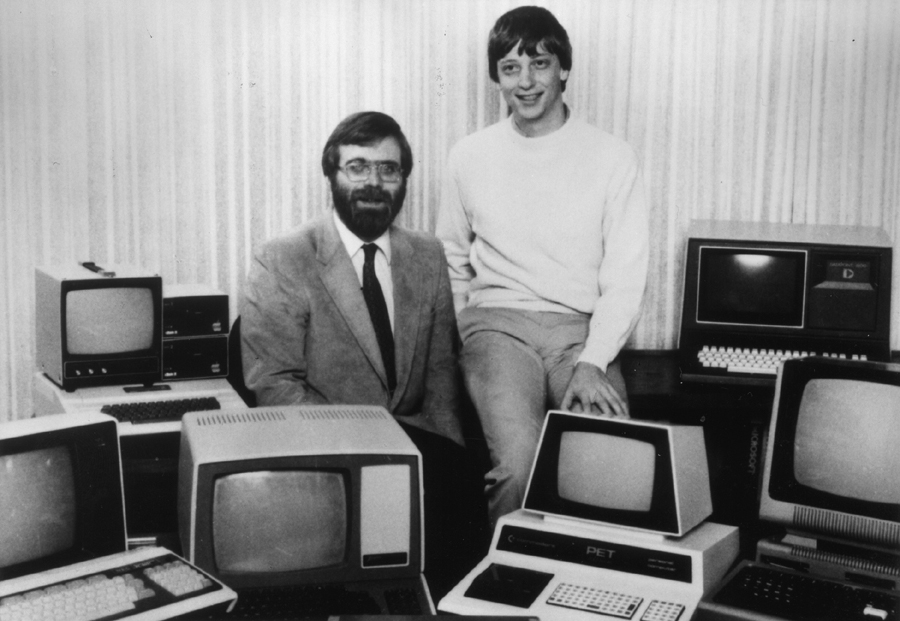
His ability to think creatively and solve complex problems was an important reason for Microsoft’s early success. This photograph was taken shortly after the company began to grow, and we moved from Albuquerque to Seattle.
On the other side of the corridor from my office and Paul's office was a giant room. There were a lot of tables with different systems arranged on them, and it was there that Paul and I did most of our work. The photo got the machines that we used to create a large number of early software from Microsoft.
Although at that time we mainly concentrated on work, Paul did not miss the opportunity to be interested in other topics. After leaving the company, he began to explore all these areas as he could only.
Once we watched the Seattle Supersonics basketball club together. He turned to me and asked: how do I think, can anyone just pick up and buy a sports team. I thought he was joking! None of our schoolmates could suspect the future owner of a sports team in the Field.
However, in 1988, he bought the Portland Trail Blazers. And then, after a few years, Seattle Seahawks.
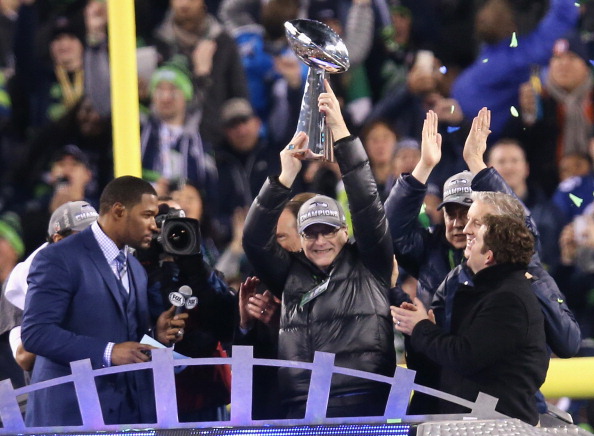
The latter subsequently proved to be a valuable investment, but he did not buy it for that. The previous owner said that "Seahok" move to southern California. The city was in mourning. Local authorities contacted Paul. They knew that he was the only sports lover in the city who could afford to leave them at home.
At the time, Paul was not a serious fan of American football. And the team was so-so. But he wanted to help Seattle - so he took the risk and became the new owner of Seahok. And it obviously paid off.
Paul did a lot for the city. He loved our hometown and always wanted to improve it. He gave millions to improve the living conditions of homeless people in the region and helped turn the wasteland in the suburbs into one of the most living areas.
He founded a very cool "Museum of Pop Culture", supported the local alternative radio station, saved the Cinerama cinema, in which we ran kids. The University of Washington for its contribution named the Department of Informatics in his honor.
Seattle also based, what, in my opinion, could be the most lasting result of his work: the Allen Institute.
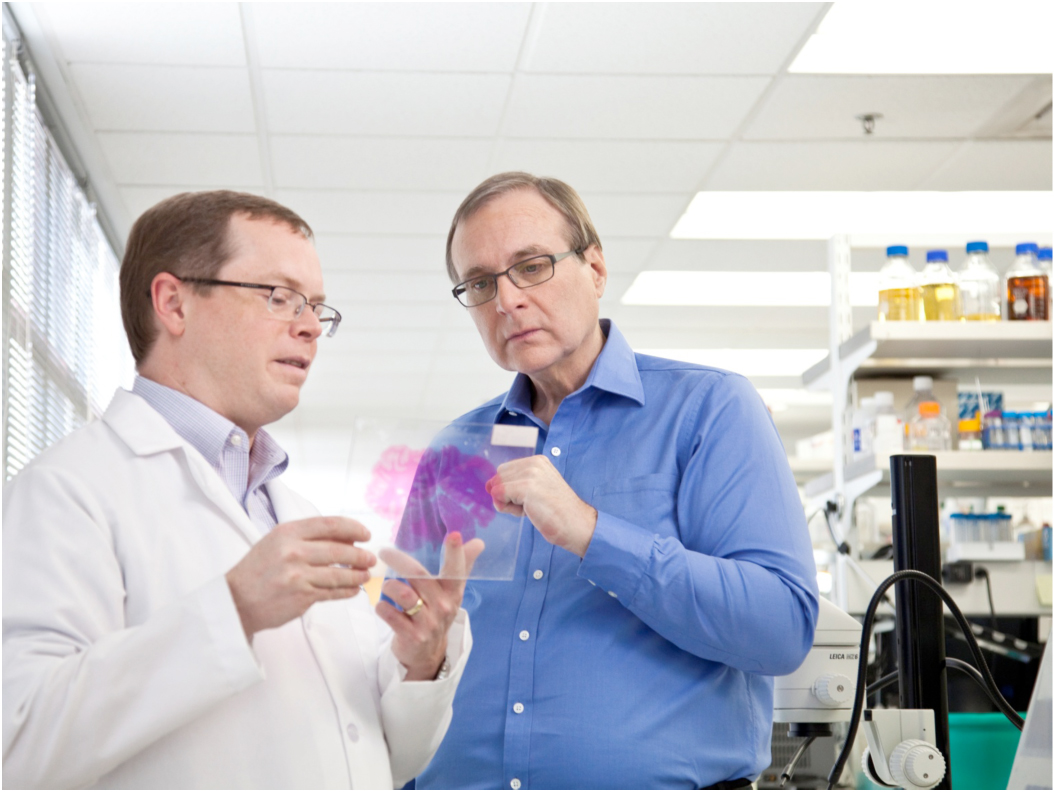
Paul always wanted to push the boundaries of science. He did this when we tested the limits of chip capabilities at Microsoft, and he continues to do it today, even after his death, through the work of the Allen Institute.
When I first learned that he was creating an organization to study the work of the brain, I thought: "Well, of course." Since childhood, Paul had a passionate desire to understand the workings of the human mind. How does he study? Will the software ever be able to repeat this?
When developing software, it is very important to understand how the brain works. And the more you study it, the clearer it becomes how little we actually know.
Each of the divisions of the Allen Institute is devoted to the disclosure of the mysteries of the body. In addition to the brain, the institute has been studying cells, bio-sciences, and also, since last December - two months after the death of Paul - immunology. There is also a separate institute dedicated to the study of AI for the benefit of society.
And they are all just starting their research. Although they have already produced amazing results - in particular, advanced brain maps - I think their most important discoveries are still ahead.
I wish Paul could see all the goodness that generated his generosity. He was one of the most thoughtful, ingenious and curious people of all that I knew. He deserved much more time than he did — although no one would say that he did not live his life well enough.
When he became one of the first signatories of the “ Oath of Donation ” philanthropic company, he said: “Our capital is ultimately not determined by dollars, but by how well we serve other people.” By this measure, Paul's life was incredibly valuable. I will miss him terribly.
Thank.

Paul Allen was one of the most curious people I knew. Even when we were children, it seemed to me that he was interested in absolutely everything. Paul could equally well discuss Shakespeare, play the guitar and talk about computers.
')
As an adult, Paul continued to be just as curious. This influenced all facets of his life, including the approach to philanthropy. His generosity was well known, but I would like more people to know how diverse it was. He has influenced so many areas of life, from scientific research and nature conservation to social work.
Recently, I had the opportunity to talk about Paul (and show old photos!) At a congress of philanthropists in New York, organized by Forbes, where he was posthumously awarded the award “For Career Achievements in Philanthropy”. And that's what I told there.
Speech at the Forbes Charity Congress
June 27, 2019
New York
I am flattered by the opportunity to talk today about my friend, Paul Allen, who this year receives the award For Career Achievements in Philanthropy.
In order to fully appreciate the philosophy that Paul adhered to as part of charity, you need to know about him this: Paul’s entire life has been motivated by his incredible curiosity. Even when we were children, it seemed that he was interested in absolutely everything.
And later, Paul donated funds to solve a huge range of problems not related at first glance to each other. He wanted to prevent the poaching of elephants, to improve the state of the ocean, to promote smart cities. He sponsored the construction of homes for the homeless and the teaching of the arts in Puget Bay. Only in 2014, he supported research on the polio virus, attempts to contain the Ebola epidemic in West Africa, and built a terrific new institute for AI research.
To those who knew him, Paul's portfolio logic was easy to understand. He donated to those things that interested him most, and in those places where, in his opinion, he could influence the situation most of all. Although Paul was interested in many things, he had a deep passion for each of them.

For the first time I saw how much Paul could get carried away with any topic, even in the 8th grade. According to this photo, you might think that he is my teacher, although in fact he was then a sophomore, and less than three years older than me.
This teletype brought us together. Our Lakeside school sold the junk, and bought a teletype with the money. We were just crazy about him. The problem was that it was very expensive to use - at $ 40 / hour! And the only way for us to get computer time was to exploit the error found in the accounting system.
We were eventually burned, but this led to the creation of our first official partnership: we agreed with the company that we would use computers for free, for which we undertook to look for problems in them.
Almost all of our free time we spent with one of the local computers, which only could reach. But then Paul was so interested not only in computers.

This is a photo from his graduation school album. He always loved to read, and he chose all these books himself. They are difficult to distinguish, but among them are the “ Dubliners ” by James Joyce, textbooks on philosophy and physics, and the Bible. Despite the impressive size of the pile, none of the books of his favorite genre: science fiction. I thought I read a lot of fiction, but he crossed out all my achievements. “The Moon is a Harsh Mistress,” all the Heinlein books, the Founders series — we used to go to his house to visit his collection of books, and make sure that I didn't miss anything.
Paul's father was an assistant librarian at the University of Washington. Every time I came to their house, I saw that his home was filled with books. And since Paul had read so much, he knew a lot about many things.
Once I was interested, suddenly, gasoline. I did not understand what "distillation" means. Therefore, I turned to the most erudite person of all that I knew. Paul explained this process to me very clearly and interestingly.

Paul was also a cooler guy than me. He played guitar, he really liked Jimi Hendrix, and I remember how he played for me. Are You Experienced? Then I was still not experienced in almost anything.
However, Paul liked this album so much that he wanted to share it with me. His early love of music — and pop culture in general — influenced what he would later donate.
Once, when we were in Boston, he demanded that I rush with him to the nearest newspaper shop. He wanted to show me the cover of the January issue of Popular Electronics from 1975. It showed the new Altair 8800 computer, which was working on a new powerful chip. I remember how he held this cover and said: “It happens without us!”
Paul was always good at thinking strategically. He before most people realized that with increasing power of microprocessors, the only thing that will limit their capabilities is software.

His ability to think creatively and solve complex problems was an important reason for Microsoft’s early success. This photograph was taken shortly after the company began to grow, and we moved from Albuquerque to Seattle.
On the other side of the corridor from my office and Paul's office was a giant room. There were a lot of tables with different systems arranged on them, and it was there that Paul and I did most of our work. The photo got the machines that we used to create a large number of early software from Microsoft.
Although at that time we mainly concentrated on work, Paul did not miss the opportunity to be interested in other topics. After leaving the company, he began to explore all these areas as he could only.
Once we watched the Seattle Supersonics basketball club together. He turned to me and asked: how do I think, can anyone just pick up and buy a sports team. I thought he was joking! None of our schoolmates could suspect the future owner of a sports team in the Field.
However, in 1988, he bought the Portland Trail Blazers. And then, after a few years, Seattle Seahawks.

The latter subsequently proved to be a valuable investment, but he did not buy it for that. The previous owner said that "Seahok" move to southern California. The city was in mourning. Local authorities contacted Paul. They knew that he was the only sports lover in the city who could afford to leave them at home.
At the time, Paul was not a serious fan of American football. And the team was so-so. But he wanted to help Seattle - so he took the risk and became the new owner of Seahok. And it obviously paid off.
Paul did a lot for the city. He loved our hometown and always wanted to improve it. He gave millions to improve the living conditions of homeless people in the region and helped turn the wasteland in the suburbs into one of the most living areas.
He founded a very cool "Museum of Pop Culture", supported the local alternative radio station, saved the Cinerama cinema, in which we ran kids. The University of Washington for its contribution named the Department of Informatics in his honor.
Seattle also based, what, in my opinion, could be the most lasting result of his work: the Allen Institute.

Paul always wanted to push the boundaries of science. He did this when we tested the limits of chip capabilities at Microsoft, and he continues to do it today, even after his death, through the work of the Allen Institute.
When I first learned that he was creating an organization to study the work of the brain, I thought: "Well, of course." Since childhood, Paul had a passionate desire to understand the workings of the human mind. How does he study? Will the software ever be able to repeat this?
When developing software, it is very important to understand how the brain works. And the more you study it, the clearer it becomes how little we actually know.
Each of the divisions of the Allen Institute is devoted to the disclosure of the mysteries of the body. In addition to the brain, the institute has been studying cells, bio-sciences, and also, since last December - two months after the death of Paul - immunology. There is also a separate institute dedicated to the study of AI for the benefit of society.
And they are all just starting their research. Although they have already produced amazing results - in particular, advanced brain maps - I think their most important discoveries are still ahead.
I wish Paul could see all the goodness that generated his generosity. He was one of the most thoughtful, ingenious and curious people of all that I knew. He deserved much more time than he did — although no one would say that he did not live his life well enough.
When he became one of the first signatories of the “ Oath of Donation ” philanthropic company, he said: “Our capital is ultimately not determined by dollars, but by how well we serve other people.” By this measure, Paul's life was incredibly valuable. I will miss him terribly.
Thank.
Source: https://habr.com/ru/post/458834/
All Articles